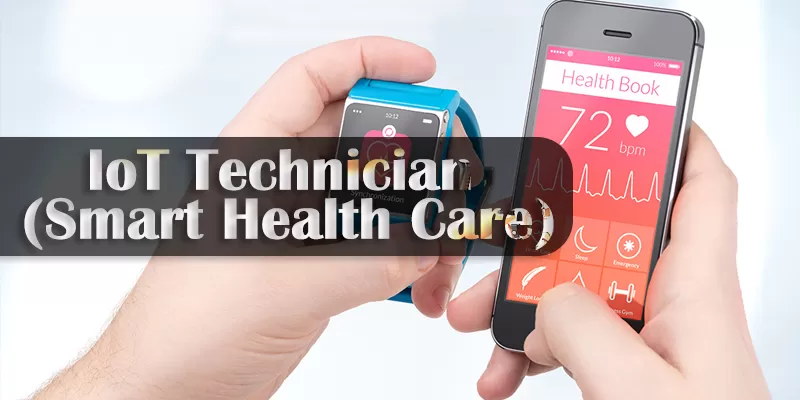
ITI Trade: IoT Technician (Smart Health Care)
Powered by NCVT (National Council for Vocational Training)
Overview
The IoT Technician (Smart Health Care) ITI trade is a specialized job-oriented vocational program, designed to develop skilled professionals capable of implementing and maintaining Internet of Things (IoT) solutions in the healthcare sector. This trade is powered by NCVT, ensuring a standardized curriculum that meets national and international industry requirements.
With healthcare systems increasingly adopting smart technologies to enhance patient care, streamline operations, and improve outcomes, the demand for qualified IoT technicians in smart healthcare is on the rise. This course empowers students with the knowledge and practical skills to support the development, deployment, and maintenance of IoT-enabled healthcare applications.
Why Choose IoT Technician (Smart Health Care)?
- High-Demand Industry: Smart healthcare solutions are transforming the medical sector, offering job opportunities in hospitals, clinics, medical device companies, and more.
- Government and Private Sector Jobs: Opens doors to roles in both sectors under government healthcare initiatives and private smart health projects.
- Self-Employment Opportunities: Skills acquired can help start ventures in IoT healthcare services, consultancy, or medical device maintenance.
- Global Relevance: Designed to fulfill both Indian and international healthcare industry standards.
Course Duration
- Total Duration: 1 Year (2 Semesters)
Eligibility Criteria
- Educational Qualification: Passed 10th standard under 10+2 education system or equivalent.
- Age Limit: Minimum 14 years at the time of admission.
Skills You Will Learn
- Introduction to IoT and Smart Health Care Concepts
- Basics of IoT in the healthcare sector.
- Understanding the smart healthcare ecosystem.
- Medical Devices and Sensor Integration
- Working with health-monitoring devices (heart rate, glucose monitors, pulse oximeters, etc.)
- Integration of biosensors and medical actuators.
- Networking and Communication Protocols
- Data communication protocols specific to healthcare (HL7, FHIR).
- Wireless communication: Wi-Fi, Bluetooth Low Energy (BLE), ZigBee, LoRaWAN.
- Microcontrollers and IoT Hardware
- Hands-on training with microcontrollers (Arduino, Raspberry Pi, ESP32).
- Developing embedded systems for medical devices.
- Data Analytics and Cloud Computing
- Collecting and analyzing health data.
- Introduction to cloud platforms (AWS, Azure) for healthcare data storage.
- Understanding healthcare data privacy and security (HIPAA compliance concepts).
- Smart Health Applications
- Patient monitoring systems (remote & in-hospital).
- Wearable health tech solutions.
- Telemedicine platforms and applications.
- Emergency response systems and smart ambulances.
- Programming and Software Development
- Programming languages: Python, C/C++ for healthcare IoT devices.
- Mobile app development basics for healthcare monitoring.
- Troubleshooting and Maintenance
- Maintenance of medical IoT devices and systems.
- Troubleshooting communication and hardware failures.
- Healthcare Industry Standards
- Health and safety regulations.
- Ethical considerations in handling patient data.
- Project Work
- Developing real-time IoT healthcare solutions.
- Creating working prototypes for smart healthcare systems.
Job Roles After Completing the Course
- IoT Technician (Smart Health Care)
- Biomedical Equipment Technician (IoT-enabled)
- Healthcare IoT Device Installer & Maintainer
- IoT Application Support Technician (Health Care)
- Telemedicine Support Specialist
- IoT System Integrator (Smart Health Solutions)
- Self-employed IoT Health Care Consultant/Entrepreneur
Employment Sectors
- Hospitals & Clinics
- Telemedicine Service Providers
- Smart Healthcare Device Manufacturers
- Government Health Projects & Smart Health Initiatives
- Health IT Companies and Startups
- Research and Development in Smart Health Solutions
- Freelance & Entrepreneurial Ventures
On-Job Training (OJT)
Students will undergo On-Job Training in healthcare environments such as hospitals, medical device companies, and smart health tech firms. This provides real-world exposure to IoT systems in healthcare.
Learning Outcomes
- Install, configure, and maintain smart healthcare devices.
- Develop IoT-based health monitoring and management systems.
- Ensure secure communication and storage of patient health data.
- Apply IoT technologies in remote patient care and emergency services.
- Understand compliance with healthcare data privacy and security standards.
Future Scope and Higher Education
- Opportunities for higher education in IoT Development, Biomedical Engineering, Healthcare IT, or Data Science.
- Scope for certification in Telemedicine and Healthcare Technology.
- Eligible for national and international job roles in smart healthcare projects.
Conclusion
The IoT Technician (Smart Health Care) trade equips students with future-ready skills to thrive in the rapidly evolving healthcare industry. As India and the world continue to adopt smart healthcare solutions, this trade offers vast opportunities for skilled professionals.
